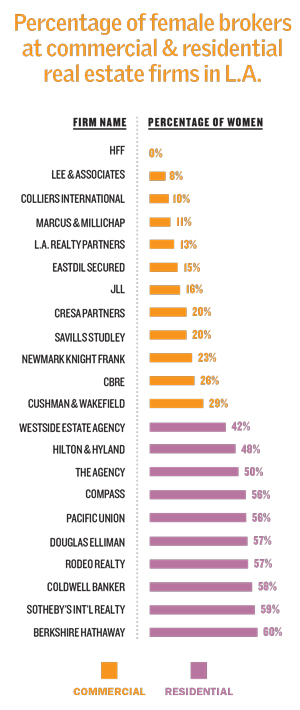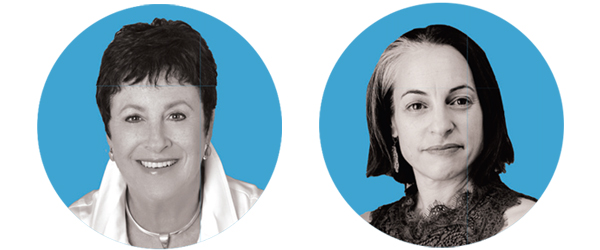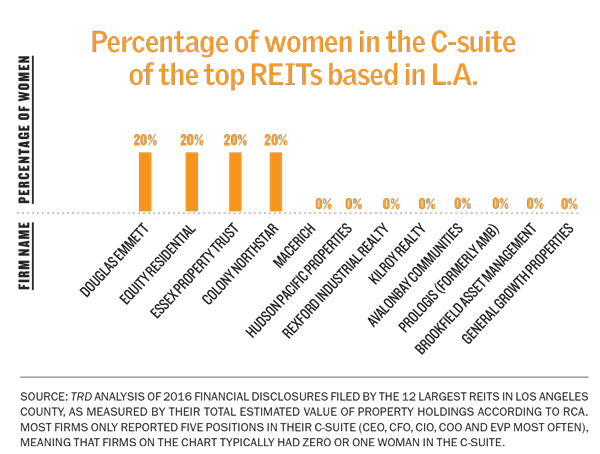As West Coast senior vice president of development for Seritage Growth Properties, Kacy Keys has reached a level of leadership that women haven’t often achieved in Los Angeles’ commercial real estate scene. But the road to Keys’ powerful perch was not without substantial hurdles.
“As a young woman in the business, there are often assumptions of who you are at the table,” Keys said. “I’ve been in rooms where people assume I was somebody’s assistant.” And Keys is far from alone, according to several interviews with women in managerial roles in L.A.’s commercial sector.
The #MeToo movement has led to scrutiny of the way power dynamics play out in the workplace, as well as an atmosphere of zero tolerance for claims of sexual harassment involving prominent men in entertainment, politics, media and business. But the dramatic gender gap in commercial real estate has many industry women saying that despite the increased attention to these issues, the boys’ club that has existed for so long will be difficult — if not impossible — to dismantle, stymieing the ability of many women to succeed in the sector.
“If you come in feeling unsure or feeling like it’s a man’s world, then you’re at a significant disadvantage,” said Jaime Lee, CEO of real estate investment, management and development firm Jamison Services.
As businesses across industries come under the microscope, The Real Deal took an in-depth look at just how the gender ratio of commercial brokers plays out in L.A.’s top firms by analyzing broker license data filed with the state.
 Commercial firms were selected for inclusion in TRD’s analysis based on published rankings of both top investment sales and top leasing brokerages in L.A. County in 2016 and 2017. None of the firms had an equal ratio of male to female brokers, TRD’s analysis found.
Commercial firms were selected for inclusion in TRD’s analysis based on published rankings of both top investment sales and top leasing brokerages in L.A. County in 2016 and 2017. None of the firms had an equal ratio of male to female brokers, TRD’s analysis found.
HFF had the lowest percentage of female brokers in L.A., with none on their roster. Lee & Associates followed that, with 8.3 percent, while Cushman & Wakefield had the highest at 28.7 percent.
And the forecast for a major uptick in female commercial brokers is dim. In the leading educational program for commercial real estate, known as CCIM, only 29 percent of the program’s members were female, according to a company representative.
Not unlike Hollywood entertainment and D.C. politics, commercial real estate in L.A. also grapples with a severe diversity problem at the highest levels of leadership.
At L.A.’s top REITs in 2016 (as determined by Real Capital Analytics), hardly any women sat among the named executive officers. Local companies like Hudson Pacific Properties and national players like Macerich and Prologis had no women at the top, according to TRD’s analysis of the firms’ most recent financial disclosures, released last spring.
And another study supports these findings at the executive level: The 2015 Commercial Real Estate Women Network Benchmark Study found that 17 percent of men surveyed held executive roles, while only 9 percent of women could say the same.
Breaking into the Boys’ Club
Today’s female professionals in commercial real estate say the industry always has been and continues to be a boys’ club. “It’s still a fraternity and there are still golf games, outings, trips and retreats where women are not invited,” Keys said.
Some say the struggle for upward mobility is rooted in the fact that it’s an industry that relies heavily on connections and networking at events like those mentioned above.
“Commercial real estate really is a pool of experience and who you know,” said Sharoni Little, an associate professor at University of Southern California’s Marshall School of Business. “You almost have to be invited to certain levels of participation and, because it’s very relational, people by human nature find people who are similar to them.”
Many deals also occur in after-hours environments, such as the golf course, where women aren’t often present either because they weren’t invited or because they traditionally work 9-to-5 hours, said Lynn Owen, chief operating officer of investor and operator TruAmerica Multifamily.

Carol Schatz and Kacy Keys
“I think women are more serious about getting the deal done during the workday,” Owen added.
When first starting out, Owen first had to work as a secretary to the two vice presidents before she could even work with customer complaints. “I couldn’t have a middle-management job — I was a female and I had to do this,” Owen added.
But that wasn’t her worst experience in trying to break into a male-dominated industry. While at the same firm, which Owen asked TRD not to name in this report, her idea in a company-wide contest won the $1,000 grand prize — except it wasn’t her name that flashed across the screen. The company had named her male supervisor — a man she refers to as a very handsome “Mr. Up-and-Comer” — as the winner. After raising the issue with the company’s president, who suggested her supervisor would “take her to lunch” in return, Owen resigned that same day.
Show me the money
But even when women do achieve recognition and promotion in the field, there’s another ugly truth at hand.
The wage gap in commercial real estate is among the widest in the real estate industry, with women making about 23.3 percent less than their male colleagues, according to the CREW report from 2015. The industry’s median annual compensation was $115,000 for women and $150,000 for men, the survey found.
Commercial landlord Douglas Emmett’s sole female exec, the chief financial officer, had an adjusted total salary — including base, bonus, equity and other compensation — of $749,000 in 2016, according to the company’s earnings records. While one can argue that different responsibilities come with differing salaries, it’s notable that her male colleagues in the C-suite — like the chief information officer and chief operations officer — made upwards of $3 million. Other male chief financial officers at comparable companies, such as Rexford Industrial Realty and Equity Residential, made at least $2 million. Douglas Emmett did not respond to a request for comment on this story.
Colony NorthStar also used to have a female chief financial officer, Debra Hess, on its leadership team, but she left shortly after the company’s merger in 2017. Before her departure, Hess had pulled in an adjusted total compensation of about $4.5 million, earnings show. While her salary of $448,000 was relatively comparable to that of a male in the C-suite, a chief investment and operating officer who earned $510,000, her bonus for the year was a whopping $5 million short of what he’d received. That, coupled with a big difference in equity, translated to a $9 million gap in total compensation. Colony NorthStar did not return a request for comment on this story.
An industry “wake-up call”
Central to the push for change in how gender issues are viewed and dealt with in the workplace these days are the allegations of sexual harassment piling up against powerful businessmen.
But months before Harvey Weinstein made headlines for years of predatory behavior toward the women of Hollywood, the L.A. commercial real estate industry was rocked by its own harassment scandal, with a behemoth complaint filed against commercial brokerage Newmark Knight Frank in April 2017.

An anonymous former employee at the commercial brokerage accused the firm of sexual harassment and unlawful termination. In the complaint, “Jane Doe” filed five counts against former NKF managing director Michael Arnold, saying he repeatedly made unwanted sexual advances and comments toward her, both at the office and during out-of-office business events. When Doe brought this up to NKF’s director of operations, John Picard — who is named in the suit — she claims he dismissed her and transferred her to another office, where she said she was unable to make deals. Arnold had mysteriously quit the firm without notice in November 2016, a handful of months before the complaint was filed.
“That was probably a bigger wake-up call for our industry than anything that’s happening in Hollywood,” an executive at a local brokerage said. “It got people to have a conversation in social and business networking settings.”
Whether it stemmed from what’s happening in Hollywood or not, as the #MeToo movement unfolds, many say the impact has been trickling into commercial real estate.
Camille Renshaw, chief executive and co-founder of New York-based, tech-driven brokerage Brokers + Engineers, said she noticed a difference while her team was out with a client in December.
“We had a client who got a little frisky with someone on the team,” Renshaw said. “It happens with older male clients.” The moments following the incident played out differently than they have in the past. Rather than brushing it off, the woman who had been the subject of the unwanted advance immediately spoke up about it. The men on her team “were very protective” after that, standing in between the woman and the older male to set up a physical barrier between the two.
“I don’t think that would’ve happened 10 years ago, and probably not before #MeToo,” Renshaw said. “There was a change in my team and their freedom to speak up.”
Carolyn Leslie, senior asset manager at Atlas Capital Group, noted the shift as well.
“I would say there’s more of an increased informal sensitivity,” she said. “More conversations are cut off with phrases such as ‘I probably shouldn’t have brought that up.’”
Shauna Mattis, a JLL senior vice president in the retail division, said she expects what’s happening in Hollywood to impact every industry.
“I’ve never personally been subjected, but I do know other women have been [sexually harassed].” Mattis said.
Finding the silver lining
While being part of the minority is challenging, some women say they relish it.
“You have the opportunity to be remembered because you are the only woman in the room, and I like having that advantage,” said Jodie Poirier, managing director at CBRE’s South Bay office. She went on to say that she did not want to be judged on that basis, however: “I want to prove myself for who I am and hopefully for what I bring and can do for people, regardless of what gender I am or what category I’m put in.”

Jamie Lee
Jamison’s Lee agreed on both points. She’s helped turn her family business into a major real estate player in the industry, owning over 18 million square feet in the region with a market capitalization of over $3 billion. Last year Jamison Services sold a controlling stake in California Market Center in Downtown to New York-based Brookfield for a whopping $440 million — a deal she’s particularly proud of. No other woman was involved in the transaction, Lee said. “I’m used to being the ‘different’ person, especially a woman in a room full of men, and I think that’s what has helped me excel,” she said.
The women that have made it to the top also have an added pedigree of sorts, according to Stacy Vierheilig-Fraser, senior managing director at brokerage and property management firm Charles Dunn.
“Every once in a while someone will hire you because you are a female and it’s so unusual,” she said. “They think, ‘Oh, if you’re a female in this business, you must be pretty darn good.’” She doesn’t necessarily disagree with that assumption.
Out of the 44 brokers at Charles Dunn L.A. offices, only six are women. “Three of us are always in the top 10,” Vierheilig-Fraser said. “The women that stay and stick with it do well. They can run circles around most guys.”
Vierheilig-Fraser said she had to overcome underestimation by her peers too. She recounted one story of having prepared diligently for a meeting with a property owner she hoped would be a potential client down the road.
“I knew everything about the market, and I killed it,” Vierheilig-Fraser recalled. But to her surprise — and that of her peers, who had complimented her on the presentation — the job was ultimately handed to one of her male counterparts, she said.
A friend later informed her of what the owner had said: “Women don’t know how to deal with people in entertainment, and I think it’s going to be an entertainment company that comes in.” Vierheilig-Fraser now holds 20th Century Fox, Paramount, Disney and HBO on her client short list.
How far we’ve come
While it may look grim now, insiders said the situation for women in the industry was much worse years ago.
Carol Schatz, who is the chief executive of the Downtown Center Business Improvement District and is often referred to as the “Queen of Downtown” among peers, recalls a time when only white male faces appeared in the photographs of the Central City Association of L.A. “It really was a reflection of the power structure in L.A.,” Schatz said.
In her estimation, the playing field has evened out since then. “It’s taken too long in the commercial real estate industry, but I see that [we are] continuing to move toward full equality,” she said.
Almost everyone interviewed for this story agreed that there have been great strides toward equality in commercial real estate, and that the future looks brighter than it did a few years back.
“I think you’re going to see many more women as brokers in the next five years,” Schatz said. “I think we will start seeing them in the senior ranks in the industry, and if we don’t, then it’s time to get in the street.”
Brokerages themselves are making a clear effort to increase diversity, too. Natalie Bazarevitsch, a senior vice president at CBRE, helped found her company’s Women’s Network in 2000. It’s since grown from the initial 35 members to 3,500 members.
The company also recently hired its third female board member, an anomaly in the industry.
“I think it’s empowering and motivating to have women in roles that you can look up to,” said Poirier, who’s also at CBRE. “Leadership in the executive positions, such as the board level, is what is going to even out and bring any disparity to parity.”
Residential flip side
Over in residential real estate, it’s quite a different playing field.
Women in residential real estate continually top the charts, and there appears to be little if any gender divide in the business. Out of the Hollywood Reporter’s annual Top 30 Real Estate Agents list from 2017, 11 were female. That’s a stark upgrade from the under 0.05 percent of females present on CoStar’s 2016 Power Brokers Office Leasing list, or the 0 percent of females on CoStar’s Sales Brokers list from the same year.
The male-to-female split is much closer to the middle in residential real estate, with some local brokerages skewing female. Westside Estate Agency had the lowest ratio of females out of the top local residential brokerages with nearly 42 percent, a TRD analysis showed. About 50 percent of the brokers at the Agency and Hilton & Hyland were female, while Douglas Elliman’s representation of women exceeded 57 percent in its L.A. office. Berkshire Hathaway Home Services had the highest number, with nearly 60 percent female brokers locally.
Joyce Rey, a Coldwell Banker Global Luxury broker, agreed that the female-to-male ratio in residential is fairly equal, with maybe even more female Realtors than men.
That might be the reason why she has never felt any disadvantage due to her gender while working her way to million-dollar deals. (Rey currently has the listing for an $85 million, 6.7-acre compound in Beverly Hills and holds many of L.A.’s historic estates, such as the Samuel Goldwyn mansion and Chartwell.)
But even on the residential side, there still exists a discrepancy at the very top.
“The residential real estate companies are primarily owned by men,” Rey said. “That’s just always been the case.”
That seems to bear out for luxe brokerage Hilton & Hyland, led by Jeff Hyland and Rick Hilton; the Agency, co-founded by Billy Rose and Mauricio Umansky; Rodeo Realty, founded by Syd Leibovitch, and the now-rebranded John Aaroe Group, among others.
Smashing the patriarchy
So what’s it going to take for the commercial real estate industry to catch up to its residential counterpart?
For Lee, that’s going to require a lot of mentorship and collaboration. “We all help each other by recognizing the issues that are at hand,” she said. “Women need to form alliances where it’s not a covert industry where only one woman can make it.”
Poirier has executed this by hiring several women for her team. In her 2.5 years at CBRE, she’s hired a new operations manager, marketing manager and senior analyst — all of whom are female, she said.
“I am eternally grateful for the mentorship [Laura O’Brien of CBRE] had provided me and she’s a big reason for where I am now, and I want to pay that back and help other females along the way,” Poirier said. “I want to help those people grow.”
For others, change won’t occur until the industry as a whole goes back to the drawing board and changes hiring practices.
That means using words like “collaborative” and “compassionate” in recruiting ads, according to Brokers + Engineers’ Renshaw. “If you use words like ‘aggressive,’ you’re going to get male candidates,” she said.
Making changes in recruiting doesn’t have to just be limited to job postings, either.
“Women are great in commercial real estate — it’s just that someone has to tell them,” Renshaw said. “When you have panel opportunities or speaking engagements, don’t be hesitant to say: ‘We care a great deal about having women in our company, please apply.’”
